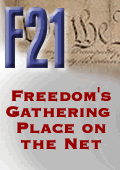Other
Ryter
Articles:
The Two Kerry's:
War Hero or
Traitor?
"Men in Black" The Cult of The Judges
U.N.
WANTS CONTROL OF THE INTERNET
By Jon Christian Ryter
October 11, 2005
NewsWithViews.com
The UN World Summit on the Information Society met for the first time in Geneva, Switzerland on Dec. 10-12, 2003 for what would begin a heated international debate over control of the Internet. The outcome of the meeting was actually scripted before the gavel calling the Summit to order ever tapped the podium. For the past decade the UN has been bombarded by complaints from every totalitarian regime in the world that wanted to place cyberborders along the information superhighway �roadblocks to communications with the free world. The voiceless anger of the anti-democracy, anti-free enterprise governments of the communist and Muslim worlds and the third world banana dictators that stewed in silent rage for years until their anger exploded into a festering, open sore that was hostile towards anything American because the United States refused to share control of the Internet�which its scientists created�with the other nations of the world who want to impose their will and prejudices on the rest of us.
Dr. Paul Twomey, the president of the Internet Corporation for Assigned Names and Numbers [ICANN] (a private corporation created by the US government to oversee the technical aspects of the Internet's address system, and to manage, coordinate and police the Internet's domain name registry) caught a 20-hour flight from Vietnam to Geneva on Dec. 8, 2003 to participate in the preparatory session of the summit that was scheduled to begin two days later. When Twomey arrived at hotel in Geneva, he was escorted out of the UN conference room by armed guards when the invited participants objected to his presence. UN officials decided to exclude all observers from the discussion. ICANN is a UN NGO. Since ICANN was the only international Internet regulatory agency at the Summit it probably seemed strange to Twomey that he was booted out of the meeting. Outside the meeting room he contacted the media by cell phone. "At ICANN," he said, "anyone can attend meetings, appeal decisions or go to ombudsmen. And, here I am outside a UN meeting room where diplomats�most of whom know little about the technical aspects [of cyberspace]�are deciding in a closed forum how 750 million people should reach the Internet. I am not amused."
Twomey and the media were barred from the preliminary session because during that session the UN and their allies in the European Union plotted on the methodology they would use to transfer the ownership of ICANN from the United States to the UN so the walls that separate the philosophies of the Mideast and the East would not be contaminated by the West. A number of countries�including Brazil, China, Cuba, Iran and several African Muslim nations�insisted that the United States be forced to surrender control of the Internet.
Over 5,000 representatives from intragovernment and nongovernment organizations, private enterprise, nonprofit organizations some of the world's highest profile Internet executives were expected to attend one or more of five Summits held over two years around the world to fashion new rules for accessing and using the Internet. The last summit is scheduled to take place in Tunis, Tunisia next month. Executives from several multi-national companies like Alcatel, America Online, Google, Microsoft, Siemens, Talal Abu-Ghazaleh, Vodafone and Yahoo were among those who attended several private meetings on Internet governance. At the heart of the discussions has been what role should intragovernment agencies, in particular, ICAAN, play in the international management of the Internet.
The argument of several third world leaders is that the United States uses the Internet as a instrument to propagate its own brand of democracy and therefore, should be stripped of its right to oversee ICAAN since it is using the Worldwide Web as a political instrument. Talal Abu Ghrazaleh, the Cairo-based Muslim e.commerce service provider, urged the UN to place ICAAN under the umbrella of the UN communications taskforce which, theoretically, gives equal status to all government, nongovernment and private sector organizations. The United States would be given the permanent presidency of an ICAAN oversight committee. The UN International Telecommunications Union and the International Chamber of Commerce�a UN NGO�would both have permanent member status as would the World Intellectual Property Organization and the UN Conference on Trade and Development. Under the Talal Abu Ghrazaleh plan, each of the world's five continents would have one elected representative on the Committee. Each continental member would be elected by all of the governments of the nations on that continent. (For example, the North American member would be elected by the joint votes of the governments of Canada, the United States and Central America. Cuba would cast its vote for the North American representative.) ICAAN itself would remain in the United States, governed by US law. The current staff of ICAAN would continue to carry out the technical work as they have in the past.
When he was apprised of the details of the UN's planned coup d' etat next month in Tunis, Twomey said he saw no reason to change the current organization setup since, at the present time, nearly 100 governments were already represented on ICAAN's advisory board. ICAAN opened regional offices in Africa, Asia, Europe, and Latin America and it now allows languages and characters other than Roman to be used in Internet addresses. Since October, 2003, countries have been able to register domain names using Chinese, Japanese, Korean and Vietnamese characters. Twomey added that ICAAN's role was limited to issues of addressing. ICAAN is not a police agency. It does not deal with law enforcement or e.commerce issues like spamming or child pornography. "These things," he said, "are not in our charter�it is not what we do. So we want to assure everyone involved that we are standing in the way."
The UN is using rampant child porn and the ever-increasing volume of spam to justify its attempts to steal control of the Internet to "protect" both children and e.commerce service providers who are losing millions of dollars per week in potential advertising revenue to spammers who flood the email boxes of millions of consumers daily with unpaid ads for everything from sexual enhancements to vitamins and herbal remedies. But the reality is there is a more sinister, political, reason for the attempt to seize control of the Internet by the UN that actually has nothing to do with the United States government using the Internet as a propaganda instrument. Rather it has to do with people living in under politically oppressive totalitarian regimes being able to see that, in the United States, in Canada, Australia and England, and largely, in the other industrial democracies of the European Union, people can speak out against their governments and not be arrested or incarcerated.
The leaders of world's remaining totalitarian regimes want the ability to create impenetrable cyberwalls around their countries to prevent western demagogues from brainwashing their "subjects" with inflammatory, indoctrinational ideological propaganda that will incite them against their masters. The Muslim nations in the Mideast and Africa want to block the evil Satan�western-style free enterprise big business, banks and Christianity�from polluting the souls of Islam. Politics. Religion. Commerce. The three-headed beast of the Great Dragon�world government.
When the issue first surfaced in 2003, a US State Department spokesman said that the "...Internet is coordinated and led by the private sector and should [remain] private sector-led." He added that the US government was committed to insuring that ICAAN remained a balanced voice for the international community, adding that the American government does not control that voice.
Clearly none of the totalitarian governments who want the UN to seize ICAAN, nor any of the other nations who want to restrict their citizens' access to the Worldwide Web or limit the ability of their citizens to communicate via cyberspace with the democratic countries, do not agree with the US State Department's view that the United States does not control ICAAN. It is common knowledge that the US government gave ICANN an exclusive two year contract in 1998 to serve as the comptroller of domain name registry, pledging to withdraw its support in 2000. However, it is now 2005 and it still has not done so.
Meanwhile an all but invisible struggle is taking place in the invisible emprey of the UN as all of the nations on Earth that stifle free speech want to control the greatest forum of free speech ever imagined by man. Leading the effort to force the United States to surrender its supervisory control over the Internet is Houlin Zhao, Director of the UN's International Telecommunications Union [ITU]. In fact, the plot to steal the Internet was hatched there. Zhao is theoretically a "former" senior People's Republic of China government official (although he unofficially remains a senior government official with all the privileges such a position provides). The ITU held a series of conferences prior to 2003 which were called the World Summit on the Information Society [WSIS] that raised the question: who should rightly control the Internet, and what regulations should govern the international exchange of ideas and information? China concluded they should. The Muslim world concluded they should. And the French concluded, anyone but the Americans.
At the 2003 WSIS meeting in Cairo, the anti-American lobby asked UN Secretary General Kofi Annan to convene a Working Group on Internet Governance [WGIG] to develop proposals to take the Internet out of the hands of the Americans and internationalize control of cyberspace. The 41-member committee included government bureaucrats, bureaucrats from NGOs, and executives from the private sector�most of whom had an axe to grind or a financial benefit that could be derived from jerking ICANN out of the hands of the US Department of Commerce. Among those 41-members were officials from Saudi Arabia, Cuba, the People's Republic of China, Iran, several African Muslim nations and a number of members of the European Union who grandiosely see themselves as the world's most economically powerful supranation. Missing was a government representative from the United States.
Who gains by internationalizing the Internet? Only dictators, despots and e.commerce opportunists who are willing to sell their souls for a profit. If the UN controlled domain name registrations, the totalitarian regimes would find it extremely easy to repress or censor selective websites�or spy on the email box or website owner.
China�which is trying to wrest control of Internet supervison away from the United States�is the worst online censor in the world. Virtually thousands of Chinese cybercops patrol the email boxes of those within their physical grasp, looking for political dissidents. Basic civil rights do not exist in China, so the cybercops do not need "search warrants" to read your mail or copy your files. Many times China relies on the foreign email sservice provider to snoop for them. Do you remember when dissident Internet journalist Shi Tao was arrested? Yahoo�an American company�invaded his privacy, copied his files and gave the evidence that convicted Shi to the Chinese government. That's the price American companies must pay to do business with communist China. They must be willing to sell their souls.
As China and several other enemies of the United States struggle to find a way to force the Bush Administration to surrender control of the Internet to the international body, the Bush-43 White House has made it clear that will not happen on his watch. The Department of Homeland Security admits that surrendering control of the Internet to anyone would increase America's vulnerability to cyberterrorism since the international body that wants to assume it�the UN�has never been able to define precisely what terrorism is, or is not and therefore, is equally uncertain how to fight it.
|
Subscribe to the NewsWithViews Daily News Alerts! |
While it is unlikely that Bush will yield on that point (just as he has refused to yield on the global warming issues tied to the Kyoto Protocol or the International Criminal Court�which his predecessor signed on to. It's equally clear that if a globalist liberal takes the White House in 2008�whether or not the GOP loses control of either or both houses of Congress�its a safe bet that Democrat will surrender control of the Internet to the UN.
Related
Article:
UN
Challanges US Internet Dominance
� 2005 Jon C. Ryter - All Rights
Reserved
Order Jon Ryter's book "Whatever Happened to America?"
Sign Up For Free E-Mail Alerts
E-Mails
are used strictly for NWVs alerts, not for sale
Jon Christian Ryter is the pseudonym of a former newspaper reporter with the Parkersburg, WV Sentinel. He authored a syndicated newspaper column, Answers From The Bible, from the mid-1970s until 1985. Answers From The Bible was read weekly in many suburban markets in the United States.
Today, Jon is an advertising executive with the Washington Times. His website, www.jonchristianryter.com has helped him establish a network of mid-to senior-level Washington insiders who now provide him with a steady stream of material for use both in his books and in the investigative reports that are found on his website.
E-Mail: BAFFauthor@aol.com
China�which is trying to wrest control of Internet supervison away from
the United States�is the worst online censor in the world. Virtually thousands
of Chinese cybercops patrol the email boxes of those within their physical
grasp, looking for political dissidents.













